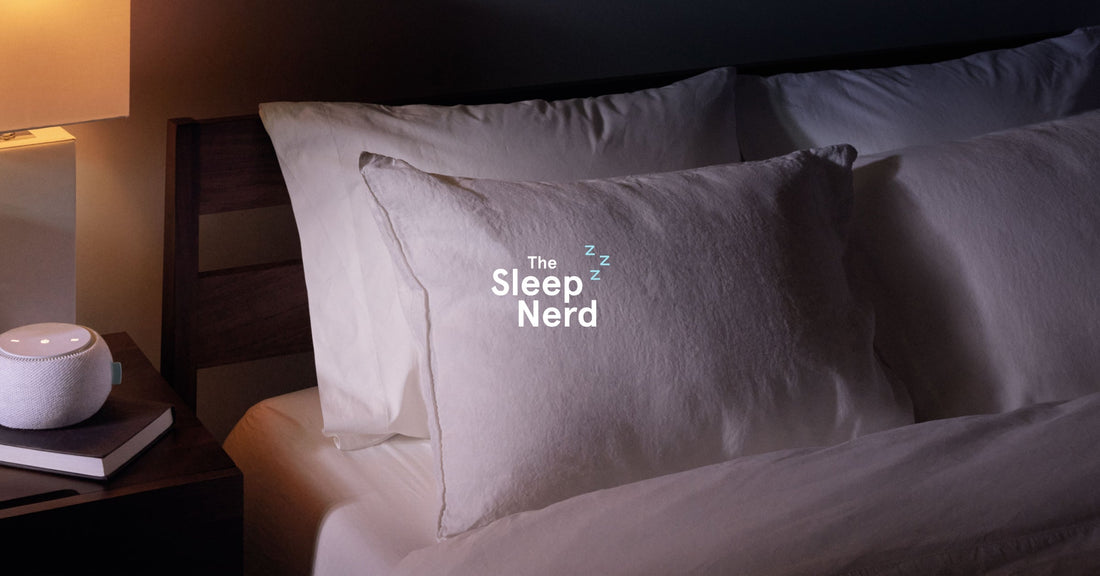
Ask the Sleep Nerd: How Much Caffeine Is Too Much?
Katie BondCaffeine. We love it. We need it. We can’t live without it. Want to know something else that’s equally as important? SLEEP. And unfortunately for us, sleep and caffeine don’t always pair so well together. That’s why we’re kicking off our new series Ask the Sleep Nerd with more info on how sleep and caffeine work against each other and how much caffeine is too much. Breaking down all the myths and truths behind that liquid gold is our Head of Sleep Experience JD Velilla. And lucky for us, he appreciates the magic of caffeine and is not trying to take it away. Here, he will help us learn about the science behind caffeine and how to use that knowledge to know if you should be having that second cup or drinking coffee before bed at night.

How Does Caffeine Work?
To understand the science behind caffeine, you must first understand Adenosine. Adenosine is the molecule in our RNA that builds up and makes us feel tired, which is an important part of the human biological process. JD explains that “Adenosine builds up pressure throughout the day to make us ready for sleep. It also pops up when we are behind on sleep and in need of rest. Caffeine works by binding to the Adenosine receptors, thus blocking the Adenosine from giving your brain the normal sleep signals it needs.” So while it might feel like life-giving energy to us, it is actually just blocking the receptors that make your body feel sleepy. That means once it wears off… boom! You’re hit with the dreaded caffeine crash AKA a lot of adenosine that has still been building up. Sneaky, right?

How Long Does Caffeine Stay In Your System and When Should I Stop Drinking Coffee?
Caffeine has a long half life, meaning that after about 5-6 hours, 50% off the caffeine you consumed is still in your system. JD recommends stopping caffeine consumption before 2pm. Because even if you do, you will have about a 25% of the caffeine still in your system at 9 or 10pm. JD also mentions, “Some people are less sensitive to caffeine and do not attribute it to their sleep problems. But, if you struggle falling asleep after a noon coffee, maybe it’s time to keep it to one cup or consider your second cup earlier than that breaking point.” Drinking coffee before bed is also a major no-no.
How Does Caffeine Affect Your Sleep?
Caffeine activates your nervous system and can negatively impact your sleep, especially if you have it later in the day. Specifically it impacts your deep sleep, which is important for a healthy immune system and muscle recovery. “Not to be confused with REM sleep, which is more brain focused and where dreams come into play, deep sleep is our more recovery-focused rest that helps us actually feel rested,” JD explains. So in order to get that recovery-focused rest, be sure to keep your caffeine intake at a healthy-for-you level.
How Do You Avoid Caffeine Crashes?
Short answer, you can’t. But you can try to lessen the crash by consuming less caffeine and ensuring you have healthy adenosine levels.
What Are Some Other Good Practices for Healthy Caffeine Consumption?
JD says “Healthy caffeine consumption starts with a healthy adenosine level. To ensure your adenosine levels are normal, make sure you are prioritizing sleep, taking naps when you need them, exercising regularly, and keeping your sleep/wake time regular.” Essentially, regularity, balance, and homeostasis is what our body needs. He also recommends laying down after you drink your coffee because the caffeine takes 30 minutes to kick in. A nap-accino is what he calls it and is something he tries to do daily with his second cup. While you might not be falling asleep, it is giving your body that rest it needs before starting the day.
The Lowdown on Caffeine & Sleep
- Caffeine works by blocking the tired signals (Adenosine) in our brains. Adenosine is the molecule in our RNA that builds up and makes us feel tired, which is an important part of the human biological process. Caffeine works by binding to the Adenosine receptors, thus blocking the Adenosine from giving your brain the normal sleep signals it needs. Keep that in mind when you have your next afternoon latte.
- Stop caffeine consumption before 2pm (at the latest). Caffeine has a long half life, meaning that after about 5-6 hours, 50% off the caffeine you consumed is still in your system. JD recommends stopping caffeine consumption before 2pm.
- Too much caffeine can affect the amount of deep sleep you get. Deep sleep is our more recovery-focused rest that is important for a healthy immune system and actually helps us feel rested. So be sure to keep your caffeine intake at a healthy-for-you level.
- A healthy lifestyle can help lead to healthy sleep. Healthy caffeine consumption starts with a healthy adenosine level. To ensure your adenosine levels are normal, make sure you are prioritizing sleep, taking naps when you need them, exercising regularly, and keeping your sleep/wake time regular.
Disclaimer:
JD Velilla is not a medical provider, therapist, counselor, social worker, registered dietician, or licensed nutritionist. JD Velilla is not providing health care, medical or nutritional therapy services, or attempting to diagnose, treat, prevent, or cure any physical, mental, or emotional issue, disease, or condition. Always seek the advice from your own physician or other qualified health care provider with any questions you may have regarding a medical condition or treatment.



